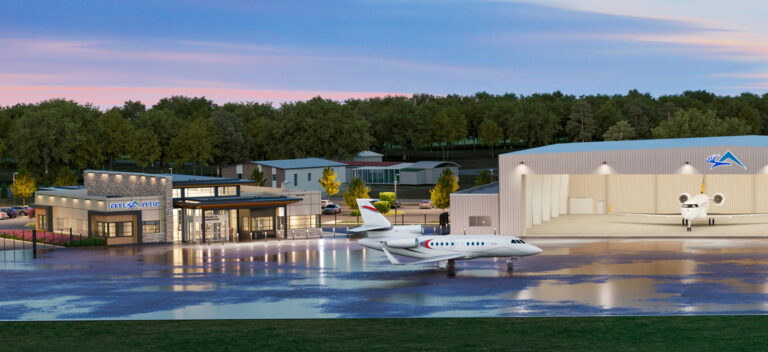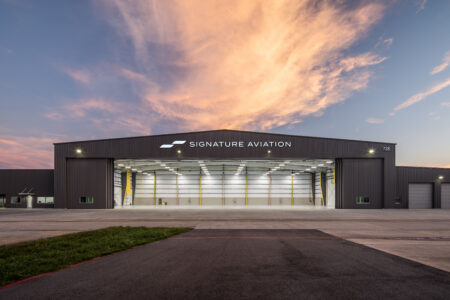Atlantic Aviation has broken ground on a redevelopment and expansion of its leasehold at Birmingham-Shuttlesworth International Airport (BHM), which will include a new FBO facility, additional hangars, and expanded ramp space.
The development brings improvements to the infrastructure, including a new executive FBO terminal, fuel farm with increased capacity, and two hangars – each roughly 30,000 square feet with office and shop spaces and 28-foot main doors for handling globally capable aircraft.
Approximately seven acres of additional ramp area with concrete hardstands for large group charter aircraft will also be added, located adjacent to private secure terminal space in one of the new hangars.
“This investment in the expansion of our presence in Birmingham is a result of outstanding collaboration with airport and city leadership,” said Kurt Schmidt, senior vice president of Operations for Atlantic’s Southeast Region. “And while we take great pride in the design of the new facility itself, we are equally as proud of the economic development benefits it will bring to the airport, its users, and the local community.”
Within the project is an approximately 7,500 square feet new executive FBO terminal building.
The new FBO will feature a spacious open concept lobby and reception area, a café, multiple conference rooms, and a large crew lounge and flight planning area to enhance their visits.
Also included in the FBO is a new training area, expanded offices, and locker rooms that enhance the operational efficiency of Atlantic team members.
“Atlantic Aviation has a long history of serving customers here in Birmingham and we are thrilled to see this level of commitment to providing first-class facilities and service,” said Ashby Pate, board chair of the Birmingham Airport Authority.
In keeping with Atlantic’s core priorities of sustainable construction and minimal environmental impact, recycled materials will be utilized throughout the construction, as well as high-efficiency HVAC, lighting, and plumbing fixtures.
One of the new hangars will have solar panels to offset its energy usage, while the other hangar will be solar capable for future development, and six electric vehicle charging stations will be present as well.
Two smaller existing hangars will be demolished to make way for the new, larger hangars, while three other existing hangars and the current FBO terminal building will be retained.
After the new FBO terminal is complete, the current FBO will undergo minor renovations to support continued operational use.
The redevelopment is scheduled for completion in early 2027.





